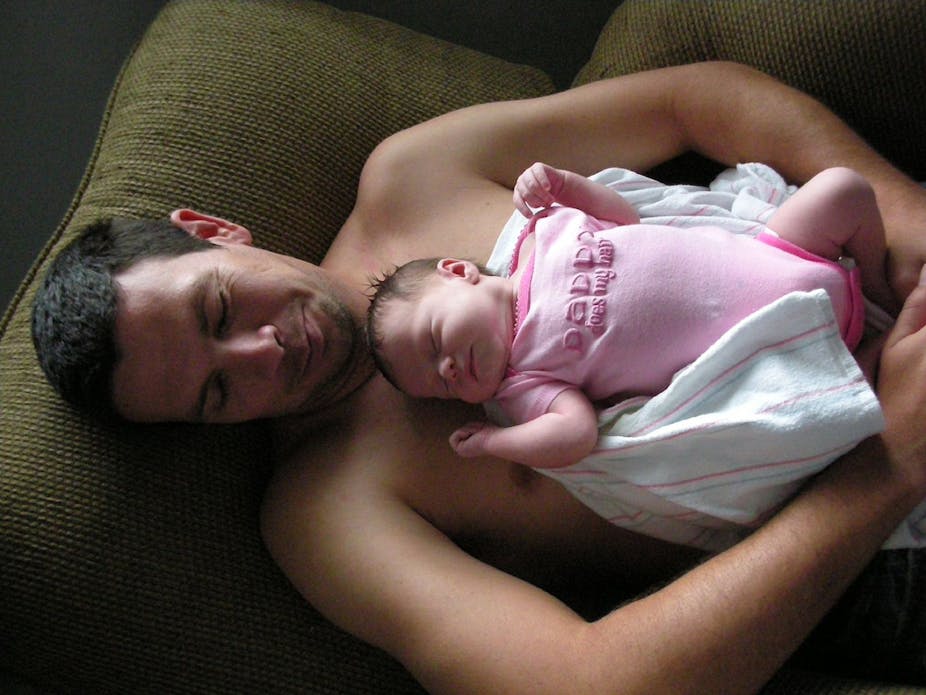The success of House Husbands, the Australian drama featuring four hands-on dads may be a signal that today’s fathers really want more involvement in their children’s lives than did previous generations.
Pundits are hailing the arrival of a new model of Australian man, a blokey bloke who really wants to spend time with children. Perhaps the usual markers for change in parenting behaviour, like the number of minutes a dad spends with the kids, are missing something.
Because, according to the “official” figures, fathers’ time with children is static. In 1997, dads spent on average three hours and 55 minutes a day caring for children, and in 2006 they spent… three hours and 55 minutes.
Over the same period, mothers increased their time by 37 minutes to average eight hours and 33 minutes a day. Viewed through the gender-equity lens, blokes are going nowhere.
There’s certainly some interest in fathers. House Husbands became the most-watched Aussie drama when 1.37 million people switched on to watch the first episode and more than a million stayed for the following weeks. This suggests that men “doing fathering” with their kids, often competently, is something worth watching.
Perhaps the shift being picked up by Channel Nine is how men feel about their kids.
The fathers in the antenatal classes I run were clear on this point. They didn’t know exactly what they were going to do after the birth but they were sure they wanted a close connection to their child. This wasn’t a sentiment isolated to dads who were professionals. One diesel mechanic told me that having a good connection would “drug-proof” his baby. If they connected early on, he said, then his child “would come and tell him stuff” as she grew older.
Perhaps what dads do with their time is changing even if the total number of minutes stays the same. The Growing Up In Australia study tracked almost 5,000 children from their first year of life. Among fathers of two- to three-year-olds, 41% reported changing nappies or helping their children with the toilet every day, and around a third helped their children get ready for bed every day.
The trouble is, we don’t have a similar study from ten years ago for comparison. But even if we did, it would still only show what dads say they’re doing, not why. Dads’ thinking and feeling about being a father will not be picked up by asking “how many times do you do [insert activity with child]?”
There is one group with a vested interest in figuring out what men feel about being a dad. When marketers’ surveys and focus groups suggest that fathers are getting a greater sense of satisfaction from their children, they pounce on the new market.
Focus groups by Lego UK found that fathers wanted a more hands-on relationship with their children than their own fathers but lacked opportunities to engage. Lego’s new campaign featured a father and son having fun building a Lego house together.
The ads didn’t feature any specific Lego set. Their intention was to show that what father and child built was not something that could be bought. As the Lego marketing manager told MarketingWeek, “It was much more of an emotional campaign rather than a specific product-driving campaign.”
Fathers’ tenderness is also starting to show up on our screens to help sell cars. Volkswagon’s new Polo ads show a father’s gentle care for his daughter from birth to when he chokes back a tear as she drives off in her first car. The ad, which includes lyrics from the song “I’ll watch over you” scored 210,000 hits in just five days on YouTube.
At the same time making fun of dads caring is becoming less acceptable. Earlier this year Huggies withdrew an ad campaign with the tagline, “Nominate a dad. Hand him some diapers & wipes, and watch the fun” in the face of widespread criticism that the ads promoted stereotypes of dads.
A recent Australian study of over 1,000 childless men and women for a company selling pregnancy test kits also underlined the change. It reported that men were just as likely as women (66% versus 67%) to desire children. One in four of the men said that seeing mums with babies made them want their own.
Perhaps we should pay more attention to advertisers when trying to decide what really drives a modern dad to cuddle up with his baby. Commercial surveys lack the objectivity of government statistics but they may be telling us something important about a shift in men’s values and emotions.

